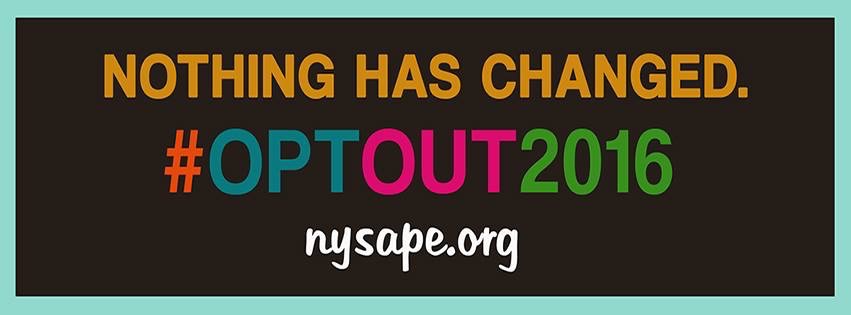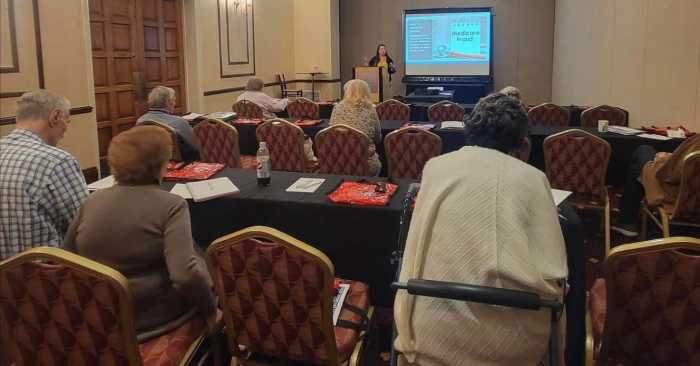The parking field at Stony Brook University overflowed with minivans and sedans of parents and educators who’d gotten last-minute word of a “listening tour” critical to informing New York Gov. Andrew Cuomo’s new Common Core Task Force about necessary modifications to the controversial education program—and ultimately, helping shape policy across the state—flooded the campus.
Filled to capacity, New York State troopers directed the still oncoming traffic to impromptu curbside spots, while inside, droves crammed into a room within the Center of Excellence in Wireless and Information Technology with just a 100-person maximum. Every folding chair was taken; people lined the back and side walls. Additional police officers held off the overflow spilling into the hallway and in front of an elevator one floor downstairs.
“Militant,” is how Michael Hynes, superintendent of Patchogue-Medford School District, recalls the armed police presence at the Nov. 6 event—which was, after all, an educational session. “Shocked,” is how he describes his emotions that afternoon.
The haphazard meeting—which most parents and teachers had only learned of two days prior—was billed as a means for relaying much-needed input and recommendations to the Cuomo administration before it charted the state’s education policies going forward regarding the much-maligned standardized testing program Common Core. Hundreds of thousands had refused to sit for the exams last year—choosing to “opt-out” instead—and the anti-Common Core movement’s resolve has only intensified since then. Opponents to the testing frantically descended upon Stony Brook University that chilly day in the hopes of providing a long list of significant changes that could improve the tests, and consequently, education, to millions of students across New York. They took time off from their typical work days in the hopes that Cuomo and his Task Force would actually listen.
Now, five months later, as the latest rounds of Common Core exams roll out across New York State—with English Language Arts (ELA) exams for grades 3 to 8 administered on April 5 to April 7 and Mathematics on April 13 to April 15—the reality has firmly set in among local education advocates, many of those who attended that day: It was all just a game of smoke and mirrors. Gov. Cuomo wasn’t really listening, but simply holding the “listening tour” to give the appearance that he’d address their concerns, fix the flaws, revamp the system. The spectacle was set up to simply placate them, make it appear that he cared, get them to shut up. It was devised to slow down the ever-growing movement. The 15-member task force and its 51-page report published in December, though admittedly implementing several of the countless suggestions relayed by the collective community of parents and educators, was overall just a huge sham, they say, and all who perhaps naively believed it would result in real, meaningful changes, have been played.
“Essentially nothing has changed except the perception that Cuomo has brought about real change,” laments Middle Country School District teacher Kevin Glynn, one of many who are disillusioned by the task force’s recommendations.
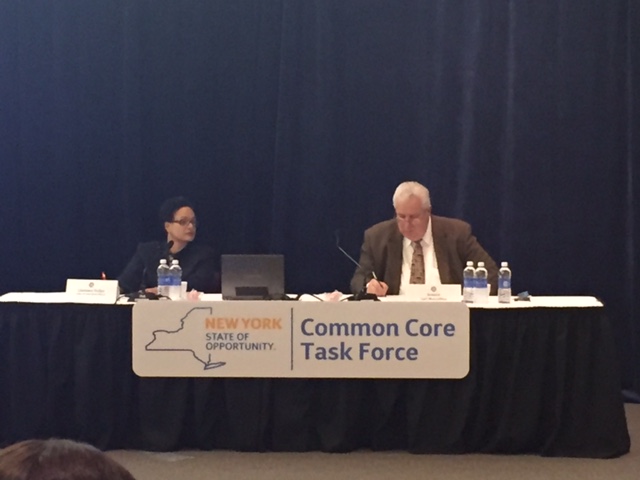
PROMISES, PROMISES
Gov. Cuomo announced the Common Core Task Force last fall to delve into parent, teacher, student, and administrator concerns before executing a new plan to tackle the disaster wrought by the botched rollout of the initiative four years earlier.
More than 240,000 students statewide “opted-out” of taking the exams last April, with the movement’s power core centered on Long Island. Then-New York State (NYS) Education Commissioner John B. King, who championed the flawed system and criticized parents and teachers who voiced concerns, rightfully became a lightning rod for attacks, and remains so. After resigning from the post amid ever-mounting opposition, King was recently appointed U.S. Secretary of Education—viewed by anti-Common Core parents and teachers across the state as a blatant indication that their calls not only fell on deaf ears among the corridors of power, but that they are being willfully ignored and even disregarded.
Also indicative of this, education advocates say, is the task force’s report, supposedly crafted with input from parents and teachers it “listened” to during its trek across the state, to highlight and address the problematic issues with Common Core reform. It proposes 20 recommendations, yet Common Core opponents bash it as lacking teeth and having no real means of implementing or enforcing the few changes it does suggest, among other criticisms.
Back in November, in that packed classroom, this wasn’t so clear. Long Island education advocates had no idea they were being bamboozled until recently, they say.
The most outspoken local critics of Common Core and familiar faces of the Opt-Out Movement were all there at Stony Brook University, among them: Jeanette Deutermann, a Bellmore mother, New York State Allies for Public Education (NYSAPE) cofounder, and “Long Island Opt-Out Info” Facebook page founder; GiGi Guiliano of East Islip, mother of three; and Tim MacDowell, a father, whose son attends Longwood School District in Middle Island.
They joined other impassioned parents and educators in voicing their long-simmering gripes to task force member Constance Evelyn and state Sen. Carl Marcellino (R-Syosset), chairman of the NYS Senate Education Committee, also a task force member.
In case things got too heated, the state made preparations to physically extinguish the flames. Troopers were stationed throughout the scene, with one telling this Press reporter, “This is a hot topic. They want everyone to feel our presence.”
Another police officer looked around at the space. “We’re already at capacity,” he said. “This is going to be a clusterfuck.”
The firebrands in attendance may say as much for Common Core, yet the colorful characterization did not match the well-organized and respectful manner in which the community addressed Evelyn and Marcellino that day.
The commissioner and senator heard stories and experiences from those in the trenches, whether they were from parents of children who’ve been subjected to the roughshod implementation of the standardized testing or from those teachers for whom 50 percent of their job security balanced on the results of its related assessments. Administrators weighed in as well.
The consensus was clear: It isn’t working. The very nature of the standards as a gauge for college and career-readiness from kindergarten was wrong. That 50 percent of teacher evaluations was based upon the flawed tests was not only improper, but a slap in the face. Children were being over-tested. The stakes were way too high for students, teachers and schools themselves.
Melissa McMullen, a sixth grade teacher in the Comsewogue School District, deemed the term “Common Core math…a euphemism for poor math instruction rooted in profit-for-publishing companies rather than powerful, strong math instruction,” and was greeted with applause from a room overflowing with supporters.
“It is not a logical path to math competency and math fluency,” she blasted.
Dan Campbell, a fifth grade teacher at South Huntington Schools, explained that “before the implementation of the Common Core, Long Islanders had a 94-percent proficiency rate in reading. Our schools were considered the best in the country. Since the implementation of the Core and the manufactured crisis known as Hurricane Bill and Melinda [Gates], I’m certain that the only thing we lead the nation in right now is the creation of anxiety.”
Michael Hynes, the superintendent of Patchogue-Medford, demanded a “cease and desist.”
“One of the goals of education is to awaken and develop the powers of creativity,” he declared. “Instead, what we have is a culture of standardization.”
“This time that we’re in, from an educational paradigm, is historical,” he continued. “The next four years will pave the way in public education for the next forty.”
Another major source of outrage among anti-Common Core activists are the very members Cuomo handpicked for the task force—proof, they say, that any true reform is impossible.
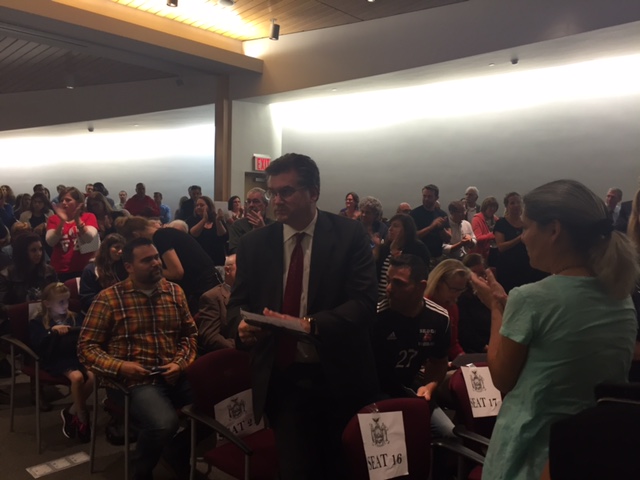
‘RIGHT THE SHIP’
“It is time to right the ship,” said Richard Parsons, senior advisor at Providence Equity Partners, Inc., former chairman of the board at Citigroup Inc., and chair of the Common Core Task Force, in the task force report. “We believe our report and recommendations reflect the thinking of a wide cross-section of citizens and education stakeholders around the State.”
The New York Common Core Task Force report listed 21 recommendations to “right the ship,” broken down into three broad goals: “establish new high quality New York standards,” “develop better curriculum guidance and resources,” and “significantly reduce testing time and preparation and ensure tests fit curriculum and standards.”
Parsons also led Cuomo’s 2012 New NY Education Reform Commission, which was tasked with shaping the New York State education agenda that largely ignored the disastrous rollout of Common Core and the punitive intertwining of teacher evaluations with standardized testing. Beyond positioning a corporate CEO with no education policy experience as the head of the Common Core task force—for a second time, reminds Long Island Opt Out Info Facebook page founder Jeanette Deutermann, an outspoken critic of the standardized exams—Cuomo also installed many of the same members of that old education reform committee on the new one. This includes: American Federation of Teachers president Randi Weingarten, State University of New York Chancellor Nancy Zimpher, the state Assembly’s Education Committee Chair Cathy Nolan, and nonprofit Parent Power Project founder and Rochester-area parent, Carrie Remis.
Admittedly, explains Deutermann, when the governor’s office sought to assemble the task force team, they did reach out to several key critics, soliciting recommendations. But those names—which included public school teachers and public education advocates such as Jamaal Bowman and Gary Rubenstein from Stuyvesant High School—never made it to the final cohort, she says.
“I have to give them credit,” she says of the task force. “They reached out and spoke to the people I recommended. They did extensive interviews and research. But the problem is that the people they actually pulled in were not appropriate. They chose parents who were tied to charter schools when this is a parents’ movement.”
Deutermann cites its chairman, Parsons, as one of the main problems.
“Parents were upset about corporate influence in public education,” she explains. “Then Cuomo chooses a bank CEO as the head of the task force. What kind of message does that send?
“They wanted to make sure they could control the outcome,” she theorizes about the administration’s picks for the task force’s makeup. “They didn’t want any surprises.”
Critics also assail the actual content of the report.
Specific recommendations include considering input from local districts, educators, and parents when creating the new standards, making the standards age-appropriate, and ensuring that the entire process is transparent. They also include flexibility for teachers to develop and tailor the curriculum within their classrooms, quoting Linda Darling-Hammond, faculty director for the Stanford Center for Opportunity Policy in Education, saying, “It is very important that the Standards be used as a guide, not as a straitjacket.”
The most comprehensive set of recommendations concern state assessments, which lie at the base of the Common Core mechanism. The report recommends protection for students with disabilities and English language learners, transparency on the quality and content of the tests, and a shortened timeframe for exams, in terms of both fewer days and hours.
NYSUT [New York State United Teachers], the 600,000-member state teachers union, celebrated with a multimedia campaign to “highlight progress.” In a press release dated January 15, NYSUT President Karen E. Magee stated:
“Unprecedented activism by parents and teachers opened the door for much-needed change in public education. The pendulum is swinging back to what’s most important—teaching and learning. At the same time, we’re reminding New Yorkers there is still a lot of work to do. We must all work together to continue this progress for our students.”
Critics—including many local education advocates—believe those task force recommendations, without altering any actual laws, have little teeth to be effective. The most headline-grabbing modification included in the report were calls for an immediate four-year moratorium on Common Core test scores counting against teachers or students, causing some parents, teachers and the state teachers union to rejoice. Yet dissenters, such as Deutermann, say Gov. Cuomo, who enacted his Education Transformation Act, which counts 50 percent of teacher evaluations based on state test scores, retains the last word by keeping the law in place while reducing the urgency to opt-out.
“So, when you first look at the preamble leading up to the task force report, it sounds like, ‘Wow—they heard us,’ because they’re really enumerating all the complaints and concerns of parents and educators,” Bianca Tanis, an elementary special education teacher, public school parent in New York’s Hudson Valley, and co-founder of New York State Allies for Public Education (NYSAPE), told the Press. “But then as you delve into the task force report, you see that there is very little substance in there in terms of change.”
That message was echoed within a blog post on New York Rank & File. Curated by a self-described “coalition of educators motivated by a desire to provide our students with an authentic, developmentally appropriate, culturally relevant, and child-centered public education,” it called upon NYSUT to clarify their million-dollar, member-funded media campaign signifying progress in public education.
“While the opt-out movement has captured the attention of policymakers, there has been no substantive change,” it reads. “The only change is that school districts must now use limited time and resources to negotiate another APPR [Annual Professional Performance Review, which determines ratings standards and assessment process for teachers’ effectiveness] plan that requires both more testing for NYS children and a continued focus on evaluating teachers through test scores.”
When the Education Transformation Act passed along with the state 2015-2016 budget, explains Tanis, the law specified that half of teacher evaluations were to be judged on the basis of state test scores. The four-year moratorium suspends the controversial Common Core test from counting toward these evaluations, causing school districts to adopt an addition test, to be approved by the state for appropriate rigor to show one-year growth per student. The Common Core tests will still be given, and results could count toward tenure decisions, and the hiring and firing of teachers.
“Teachers are still being evaluated by tests, just not the state tests,” says Tanis. “That’s the part that they’re leaving out.”
Tanis has launched a full-throttle Twitter campaign to get NYSUT to acknowledge the lack of actual progress without a change in legislation that is directed at Cark Korn, spokesperson for NYSUT. The fear is that by celebrating the Common Core Task Force’s report as significant progress, actual progress will stall, and if teachers are still being evaluated by tests, then instruction will be focused on test-prep as a result. Because of the perception that Common Core testing no longer “counts,” the fight has consequentially gone out of those teachers and students who believe significant changes are underway.
Glynn, the Middle Country School District teacher, explains:
“Message from the union is that it is fine to go back in the water.”
Hynes, the Patchogue-Medford superintendent, equates this misdirection with a metaphor of a frog and a pot of water.
“So if you place the frog in a pot of boiling water, it jumps out,” he explained to the Press. “If you placed a frog in a pot of lukewarm water and you turned it up one degree every minute, when it gets to the boiling point, the frog dies. He doesn’t know he’s being boiled to death because he can’t adapt quickly enough.
“We, in New York State and in this great nation, are being boiled to death as far as what’s happening to public education,” he continued. “And most of us don’t know it.”
“Most,” but not all, he added.
“Jeanette [Deutermann] is the kid who yelled out ‘Car!’ while we were all playing in the street,” Hynes told the Press via Facebook. “Some would like to believe the car has passed, but anyone without an agenda can see the car is still there and the engine is revving up.”
“And I think it’s more of a semi than a car!” states the Bellmore mother.
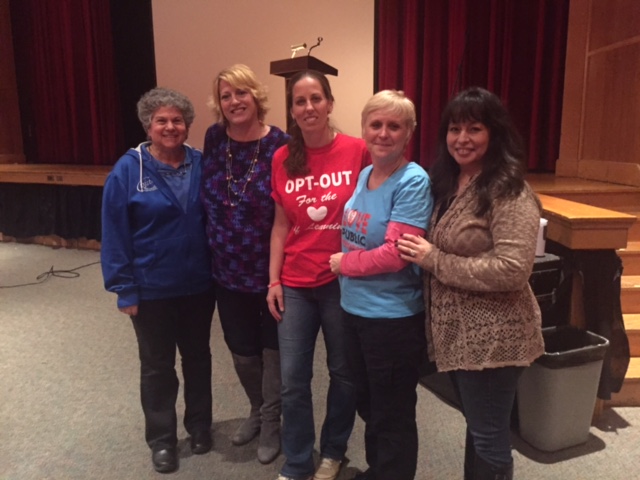
RAGE AGAINST THE MACHINE
Deutermann stresses the ever-growing importance of opting out of the Common Core tests this April—with the next round of Common Core Mathematics examinations for grades 3 through 8 to be administered in classrooms across the state on April 13 to April 15.
“It took three years of advocacy and a history-making opt-out year to force the powers that be to admit there’s a problem,” she told the Press. “Another year of high opt-out numbers may actually get some proposed changes to land in our classrooms. One thing for sure: If parents opt back in now, any potential progress will come to a screeching halt.”
The implications of the Opt-Out Movement being diminished due to complacency based on the task force recommendations and the four-year moratorium could be significant.
According to Hynes: “If we have the same or less opt-outs, I feel any progress will totally be gone.”
Progress, Hynes suggests, could be fulfilled by the restoration of local control of individual districts, the relinquishment of mandates that serve to constrain public schools from serving the needs of their communities, and the elimination of the “test and punish” model. In order to fulfill it, the state would need an education commissioner and a Regents chancellor who could earn back New Yorker’s trust and rebuild the education system with what is best for students as the top priority. But with the ascension of New York’s failed former Education Commissioner John B. King to U.S. education secretary, progress may be stalled nationwide, regardless.
Stu McMullen, a father of four, is appalled at King’s newly proposed position and told Superintendent Evelyn and Sen. Marcellino as much at Stony Brook University in November:
“The implementation of the Common Core was so poorly done that if it was in the private sector, the people involved would have been fired,” he said. “One was promoted. Illogical!”
If the heavy police presence at November’s Stony Brook University “listening tour” stop were any indication, the state education department doesn’t view massive opt-outs as “progress.”
What comes next will determine who is winning the battle of public education.




